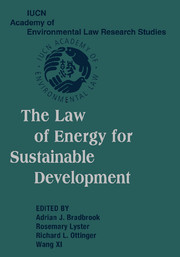Book contents
- Frontmatter
- Contents
- Acknowledgments
- Message from Kofi A. Annan, Secretary-General, United Nations
- Introduction – A Global Learned Society to Address Earth's Evolution: The IUCN Academy of Environmental Law
- Public Lectures on International Environmental Law
- PART ONE SUSTAINABLE DEVELOPMENT AND THE ROLE OF ENERGY LAW
- 1 Development and Energy
- 2 The Imperatives of Energy for Sustainable Development
- 3 2020 Energy Demand of China and Energy Conservation
- 4 Sustainable Development and the Marrakech Accords
- 5 Ethical Implications
- 6 Technological Implications
- PART TWO LEGAL ISSUES IN CONTEMPORARY ENERGY LAW
- PART THREE INTERNATIONAL ENERGY LAW
- PART FOUR COMPARATIVE ENERGY LAW
- PART FIVE ELECTRICITY RESTRUCTURING
- PART SIX FINANCING FOR SUSTAINABLE ENERGY
- PART SEVEN CIVIL SOCIETY AND THE PROCEDURAL REQUIREMENTS OF ENERGY LAW FOR SUSTAINABLE DEVELOPMENT
- Index
6 - Technological Implications
Published online by Cambridge University Press: 10 August 2009
- Frontmatter
- Contents
- Acknowledgments
- Message from Kofi A. Annan, Secretary-General, United Nations
- Introduction – A Global Learned Society to Address Earth's Evolution: The IUCN Academy of Environmental Law
- Public Lectures on International Environmental Law
- PART ONE SUSTAINABLE DEVELOPMENT AND THE ROLE OF ENERGY LAW
- 1 Development and Energy
- 2 The Imperatives of Energy for Sustainable Development
- 3 2020 Energy Demand of China and Energy Conservation
- 4 Sustainable Development and the Marrakech Accords
- 5 Ethical Implications
- 6 Technological Implications
- PART TWO LEGAL ISSUES IN CONTEMPORARY ENERGY LAW
- PART THREE INTERNATIONAL ENERGY LAW
- PART FOUR COMPARATIVE ENERGY LAW
- PART FIVE ELECTRICITY RESTRUCTURING
- PART SIX FINANCING FOR SUSTAINABLE ENERGY
- PART SEVEN CIVIL SOCIETY AND THE PROCEDURAL REQUIREMENTS OF ENERGY LAW FOR SUSTAINABLE DEVELOPMENT
- Index
Summary
The most significant achievements over the past two decades in sustainable energy development have stemmed from creating appropriate market conditions. Yet, sustainable development will be unachievable without agreement on setting appropriate boundaries on energy markets. Without aggressive efforts to deploy emissions mitigation technology over the next ten to twenty years, the atmospheric concentration of greenhouse gas emissions will double, compared to preindustrial levels (see Figure 6.1). This chapter summarizes the impact of establishing appropriate market conditions on energy use and greenhouse gas emissions in selected nations, and discusses supplemental policies, investments, and cooperation needed to achieve both development and environmental protection.
Emissions mitigation and market conditions
A review of recent history in transition and developing nations reveals significant progress in establishing the conditions necessary for sustainable energy development. In countries as varied as Brazil, China, and Poland, growth in energy-related pollution has been slowed, usually for reasons having more to do with development than environment. But this record shows the importance of establishing appropriate market conditions. The record also shows just how much more emissions will grow without setting constraints on the market that are based in environmental science, particularly atmospheric sciences. The development of legal and regulatory mechanisms is essential for sustainable energy development. Economists generally agree that the role of the government is to shape or set boundaries for markets for energy technologies. This role includes sponsoring science and technology development and technology transfer to the market.
- Type
- Chapter
- Information
- The Law of Energy for Sustainable Development , pp. 93 - 100Publisher: Cambridge University PressPrint publication year: 2005

